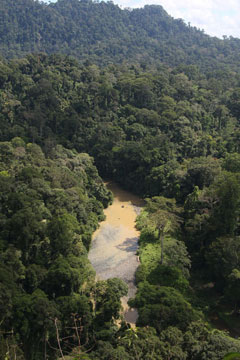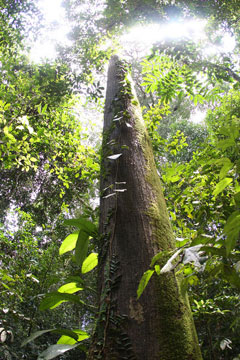14 countries win first REDD funding from the World Bank to protect forests
14 countries win REDD funding to protect tropical forests
mongabay.com
July 24, 2008
Related: 1/3 of corals face extinction
|
|
Fourteen countries have been selected by the World Bank to receive funds for conserving their tropical forests under an innovative carbon finance scheme.
The initiative, known as the Forest Carbon Partnership Facility (FCPF), was unveiled last year as a way to kick start Reducing Emissions from Deforestation and Degradation (REDD), a proposed mechanism that would reward countries with carbon credits for preserving their forest cover. Globally deforestation accounts for nearly one-fifth of anthropogenic greenhouse gas emissions — more than the transport sector.
“Deforestation and forest degradation together are the second leading man-made cause of global warming,” said Joëlle Chassard, Manager of the World Bank’s Carbon Finance Unit. “They are responsible for about 20% of global greenhouse gas emissions, and the main source of national emissions in many developing countries. For that reason, we have been eager to initiate this partnership and assist countries while building a body of knowledge on how best to reduce greenhouse gas emissions by protecting forests and helping the people who benefit from them.”

|
The 14 developing countries include six in Africa (the Democratic Republic of Congo, Gabon, Ghana, Kenya, Liberia, Madagascar); five in Latin America (Bolivia, Costa Rica, Guyana, Mexico, Panama); and three in Asia (Nepal, Lao PDR, and Vietnam). The countries will receive grant support as they build their capacity for REDD, including establishing emissions reference levels, adopting strategies to reduce deforestation, and designing monitoring systems.
“The FCPF has created a true partnership where developing countries and developed countries, alongside the World Bank, are working in a transparent and participative way to learn and support each other in the readiness process for REDD,” said Gisela Ulloa, National Clean Development Office NCDO Coordinator in Bolivia. “Selection into the program will now allow Bolivia to build its capacity to undertake actions to slow deforestation and to become an early actor in the emerging market for REDD. By joining with other tropical nations and potential carbon market actors, we expect our pace of learning, preparation, and action to address climate change to be faster and better focused on the conditions and needs of our country.”
“The selection of this initial group of developing country partners is an important first step in improving global understanding of ways to reduce forest carbon emissions and lift forest-dependent communities out of poverty,” said Robin Davies, Assistant Director General, Sustainable Development Group, AusAID, from Australia.
The announcement was made during a a two-day meeting in Paris of the FCPF Steering Committee, which is made up of “an equal number of developing and industrialized countries, plus observers from international organizations, non-governmental institutions, and forest-dependent indigenous peoples and other forest dwellers,” according to the World Bank. The nine industrialized countries included Australia, Finland, France, Japan, Norway, Spain, Switzerland, the United Kingdom and the United States. Together, they have committed to contribute about $82 million to the FCPF. The World Bank says more contributions from the public and private sector are expected soon.
Related articles
World Bank offers $300M for forest conservation, emissions reductions October 15, 2007
Tropical forest countries will be eligible for payments for preventing deforestation under a program unveiled last week by the World Bank. Called the Forest Carbon Partnership Facility (FCPF), the fund will initially provide $300 million to finance emissions reductions through forest conservation initiatives. The World Bank said the program will “help developing countries build the technical, regulatory, and sustainable forestry capacity to reduce emissions from deforestation and degradation.”
World Bank to raise $250M for avoided deforestation in tropics June 11, 2007
The World Bank will soon launch an “avoided deforestation” pilot project that will pay tropical countries for preserving their forests, reports The Wall Street Journal. The $250 million fund will reward Indonesia, Brazil, Congo and other tropical forest countries for offsetting global warming emissions.
World Bank says carbon trading will save rainforests October 23, 2006
Monday the World Bank endorsed carbon trading as a way to save tropical rainforests increasingly threatened by logging, agricultural development, subsistence agriculture, and climate change itself. In its report, “At Loggerheads? Agricultural Expansion, Poverty Reduction and Environment in the Tropical Forests”, the bank estimates that deforested land worth $200-500 per hectare as pasture could be worth $1,500-$10,000 if left as intact forest and used to offset carbon emissions from industrialized countries.
More avoided deforestation news
